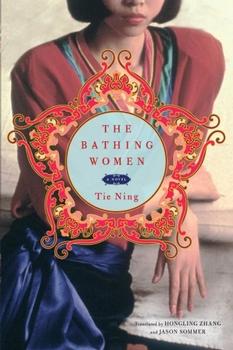Summary | Excerpt | Reading Guide | Reviews | Beyond the Book | Readalikes | Genres & Themes | Author Bio

A Novel
by Tie Ning
She curled up in her quilt nest and waited for Chen Zai's phone call. He kissed her through the phone and they talked for a long time. When Tiao hung up, she found herself still not wanting to sleep. This evening, a night when Chen Zai was far away from Fuan, she had an overwhelming desire to read the love letters locked in her bookcase. They were not from Chen Zai, and she no longer loved the man who had written her the love letters. Her desire now was not to reminisce, or to take stock. Maybe she just cherished the handwriting on the paper. Nowadays, few people would put pen to paper, especially not to write love letters.
2
There were sixty-eight letters altogether, and Tiao numbered every one of them in chronological order. She opened number one, a white paper whose edges had yellowed: "Comrade Yin Xiaotiao, the unexpected meeting with you in Beijing left a deep impression on me. I have a feeling that we will definitely see each other again. I'm writing to you on an airplane. I will arrive in Shanghai today and will leave for San Francisco tomorrow. I'll seriously consider your suggestion about writing a childhood memoir—only because it was a request of yours." The letter was signed by Fang Jing, the date was March 1982.
It was more like a note than a letter. The words, scrawled on an oversized piece of paper, seemed big and sparse. The words looked like they were staring stupidly at the reader. Strictly speaking, it was not a love letter, but the thrill that it brought to Tiao's soul was much stronger than what those real love letters of his gave her later.
The letter's author, Fang Jing, had been very hot in the movie business at the time. He'd written, directed, and acted in a movie called A Beautiful Life. After an endless run in theaters around the country, the movie also won quite a few major awards. It was a movie about middle-aged intellectuals who'd suffered horrendously during the Cultural Revolution but still managed to survive, optimism intact. Fang Jing played an intellectual imprisoned in a labor camp on the border. He was a violinist whose imprisonment gave him no chance to play the violin. There was an episode in the movie that showed how, after the hero endures heavy labor with an empty stomach, when he straightens up in the wheat field, catching sight of the beautiful sunset in the distance, he can't help stretching out his arms. His right arm becomes the violin neck and he presses on it with his left hand, fingers moving around as on the strings of a violin. There was a close-up of this in the movie, the scrawny scarred arm and that strangely transformed hand. The arm as the violin and the hand playing on it broke people's hearts. Tiao would cry every time she watched this part. She was convinced that Fang Jing wasn't performing but reliving his own experience. The scene might seem sentimental now, but back then, at a time when people's hearts had been repressed for so long, it could easily bring an audience to tears.
Tiao never thought she would come to know Fang Jing personally. She had recently graduated from university and, through connections, got a job as an editor in the Fuan Children's Publishing House. Like all young people who admired celebrities, she and her classmates and colleagues enthusiastically discussed the movie A Beautiful Life, and Fang Jing himself. They read all the profiles of Fang Jing in the newspapers and magazines and traded information with each other: his background, his life experience, his family and hobbies, his current project, what movie he entered in a film festival and what new award he won there, even his height and weight; Tiao knew all the details. It was by chance that Tiao and he got to know each other. She went to Beijing to solicit manuscripts for books and ran into a college roommate. The father of this roommate worked in a filmmakers' association, so she was very much in the know. The roommate told Tiao that the filmmakers' association was holding a conference on Fang Jing's work and that she could get Tiao in.
Excerpted from The Bathing Women by Tie Ning. Copyright © 2012 by Tie Ning. Excerpted by permission of Scribner. All rights reserved. No part of this excerpt may be reproduced or reprinted without permission in writing from the publisher.
There is no such thing as a moral or immoral book. Books are either well written or badly written. That is all.
Click Here to find out who said this, as well as discovering other famous literary quotes!
Your guide toexceptional books
BookBrowse seeks out and recommends the best in contemporary fiction and nonfiction—books that not only engage and entertain but also deepen our understanding of ourselves and the world around us.